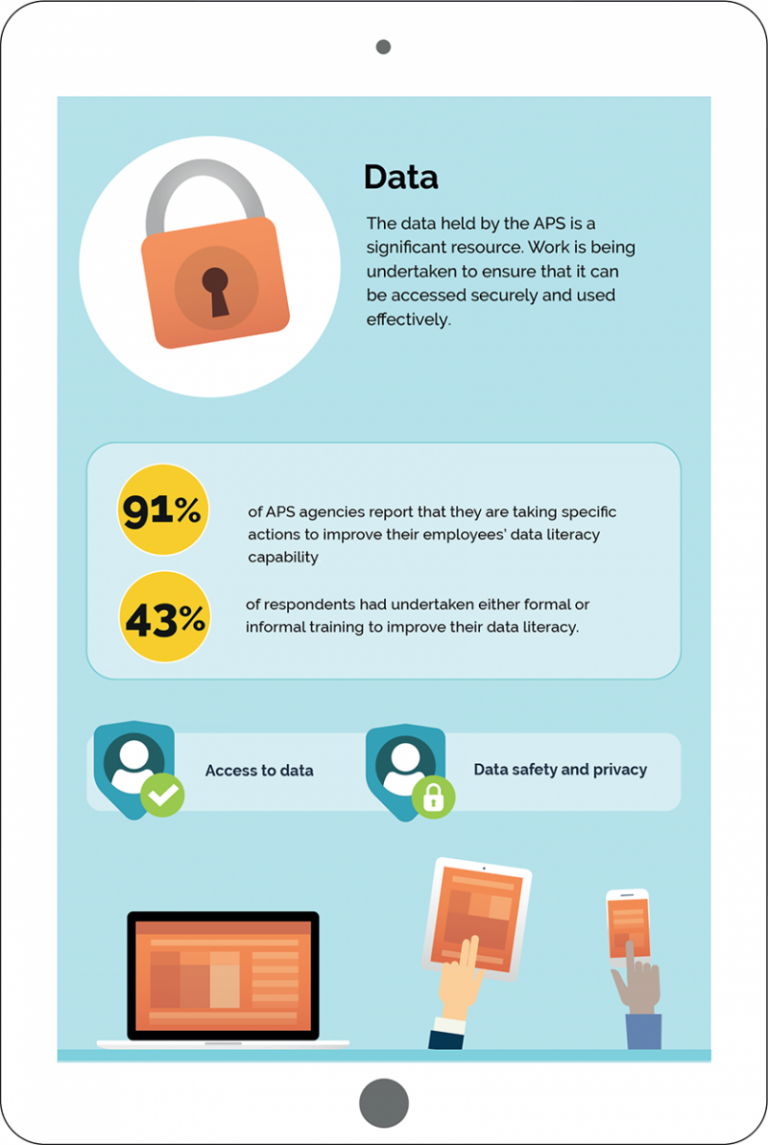Data
APS agencies collect and generate large volumes of data. These data holdings represent a significant resource. The task of facilitating access to data needs to be balanced against appropriate security and privacy requirements. Managing, using and reusing data, also requires specific skills and capabilities.

Access to data
The data held by APS agencies holds value for many, including those outside the APS. Improved use and reuse of this data are seen as a key means of driving productivity and delivering more efficient services and policy outcomes. The value of this data was highlighted in the recent Productivity Commission inquiry report, Data Availability and Use.11 The APS recognises that to realise the benefits of the data holdings, the data needs to be open and accessible.
The Department of the Prime Minister and Cabinet is championing efforts to realise the value of the data the APS holds and make it accessible. Building on the Public Data Policy Statement released in 2015, the Open Government National Action Plan 2016–18 makes a commitment to identify and release high-value datasets held by APS agencies. The Department of the Prime Minister and Cabinet is leading consultation with non-government organisations to develop a framework to identify high-value datasets and make them available for innovative use and reuse.
As the Government seeks to deliver more services to the right people for less—data will become crucial to that success.
The Hon Angus Taylor MP, Assistant Minister for Cities and Digital Transformation, Chief Data Analytics Officer Public Sector Forum, 3 May 2017.
data.gov.au
data.gov.au provides an easy way to find, access and reuse public datasets from government. The main purpose of the site is to encourage public access to and reuse of public data. It was established to support open government initiatives and is supported and operated by the Digital Transformation Agency.
Source: data.gov.au
Improved integration and use of data holdings is another key APS focus. The Data Integration Partnership for Australia is a coordinated, APS-wide investment to maximise the use and value of the government’s vast data assets. The partnership aims to improve data integration and analysis and allow cost effective and timely insights into data, while preserving privacy.
Data safety and privacy
In making data open to others to use and reuse, APS agencies must maintain the security and privacy of the data they hold. Meeting this obligation is paramount to ensuring the Australian public trusts how the APS uses the data it collects about individuals and businesses.
Given its importance, privacy and information security is a key consideration of APS activities in support of open data. The Data Integration Partnership for Australia specifically identifies the preservation of privacy and the security of sensitive data as a main goal. A secure information sharing capability is being established by the Department of Finance with the aim of having a single system that allows agencies to share and integrate datasets securely through cloud-based infrastructure.
Data literacy, capability and skills
The APS recognises the importance of building data-related skills and capabilities so it can gain greater advantage from the value of its data holdings.
The Department of the Prime Minister and Cabinet partnered with the APSC, other Australian government entities and private and academic sectors to develop a holistic approach to improving the overall data skills and capability across the APS. This partnership resulted in the recently released APS Data Skills and Capability Framework.12 Through the framework, APS employees of all skill levels and backgrounds are encouraged to identify and take up relevant learning and development opportunities.
Data skills are essential for all APS employees to support evidence-based, informed decision making, whether in policy development, programme management or service delivery. These skills also assist in improving operational efficiency, more efficient resource allocation, and improved engagement with stakeholders.
Data Skills and Capability in the Australian Public Service
In response to the increased focus on data literacy, most APS agencies are looking to build capability in this area. Ninety-one per cent report they are taking specific actions to improve employee data literacy capability. The most common method is to give employees access to learning and development opportunities. Several agencies embed learning and development in a bigger contextual and strategic framework such as data management committees and community of practice networks. Others offer in-house training and digital champions as a means of improving individual capability. Several agencies specified management of and training in electronic record management systems as an example of improving employees’ data literacy.
Responses to the 2017 APS employee census are encouraging and suggest a large proportion of the APS has or are seeking to develop data literacy. Forty-three per cent of respondents had been either formally or informally trained to improve data literacy with 49 per cent of these having been trained in the 12 months prior to the census. Another 52 per cent of all respondents felt that they would benefit from training to improve their data literacy. Only four per cent thought data literacy was not relevant to their job.
These results suggest that APS employees are likely to engage with data literacy initiatives and that data literacy levels across the service will improve.



